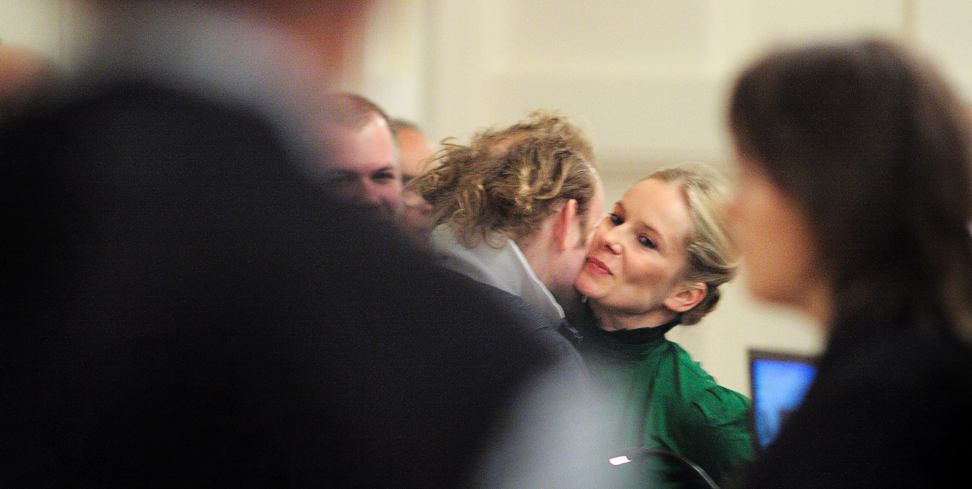
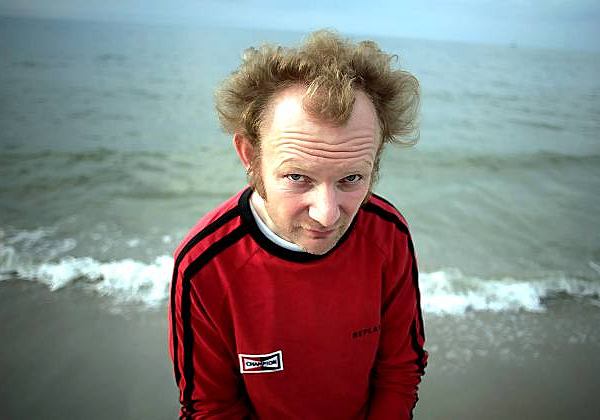
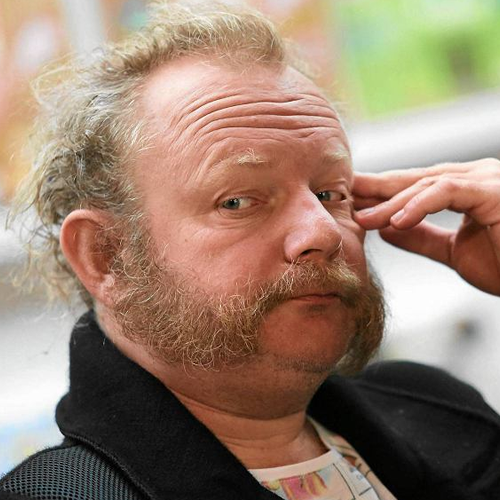
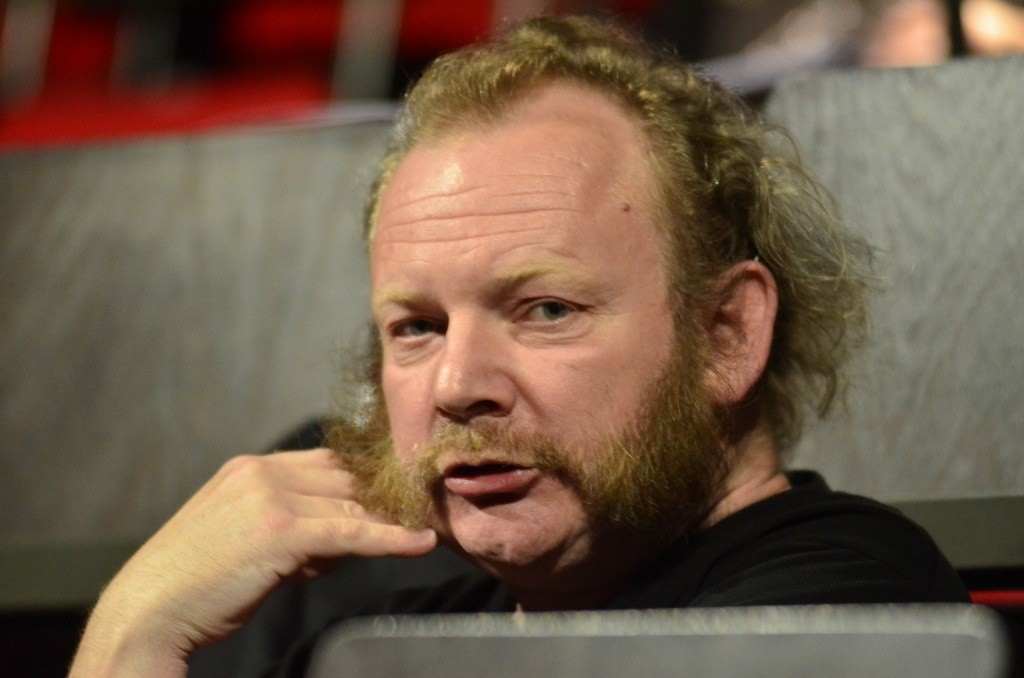
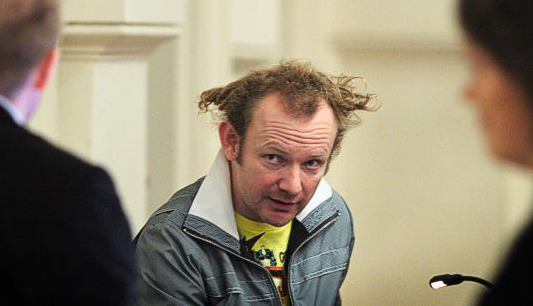
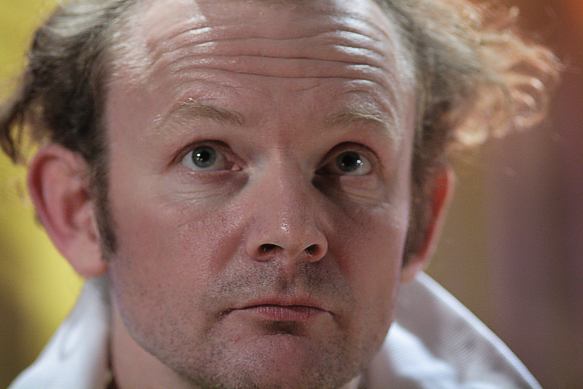
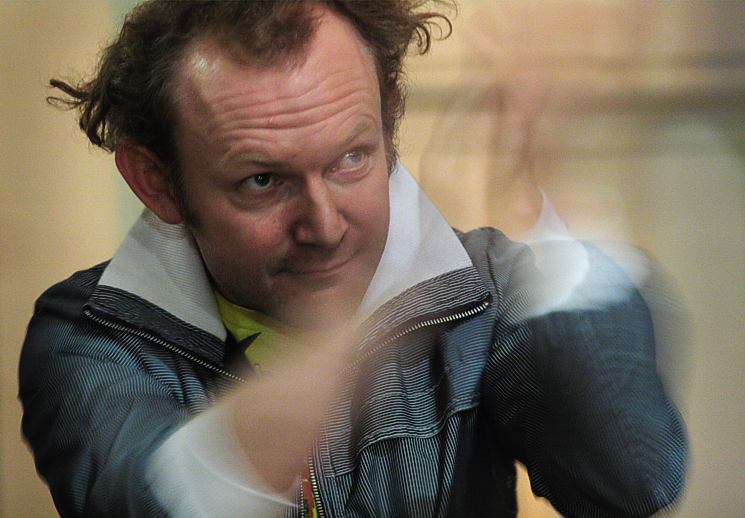
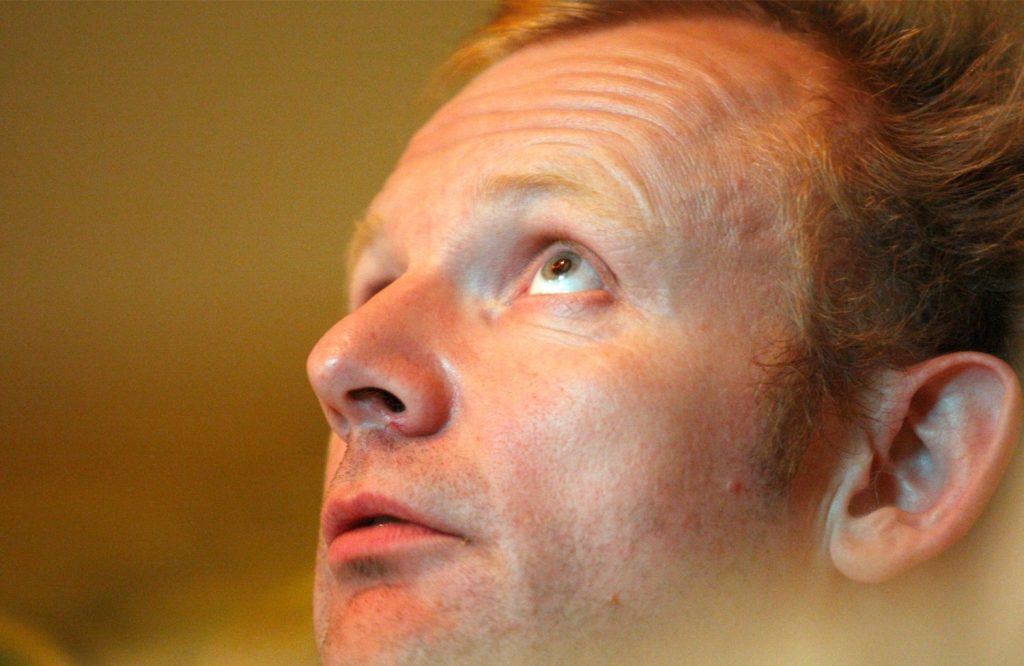
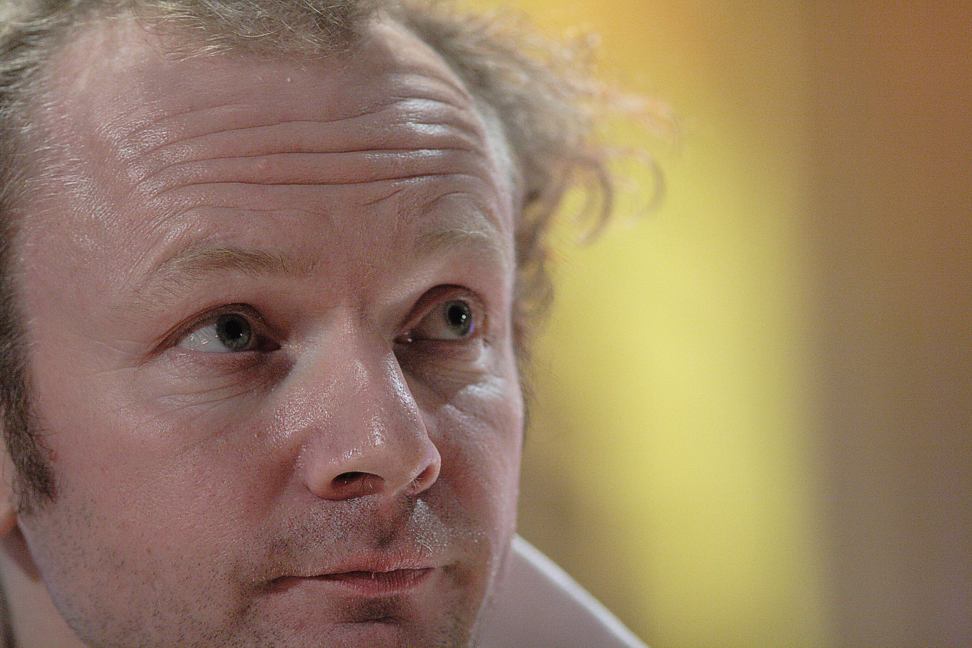
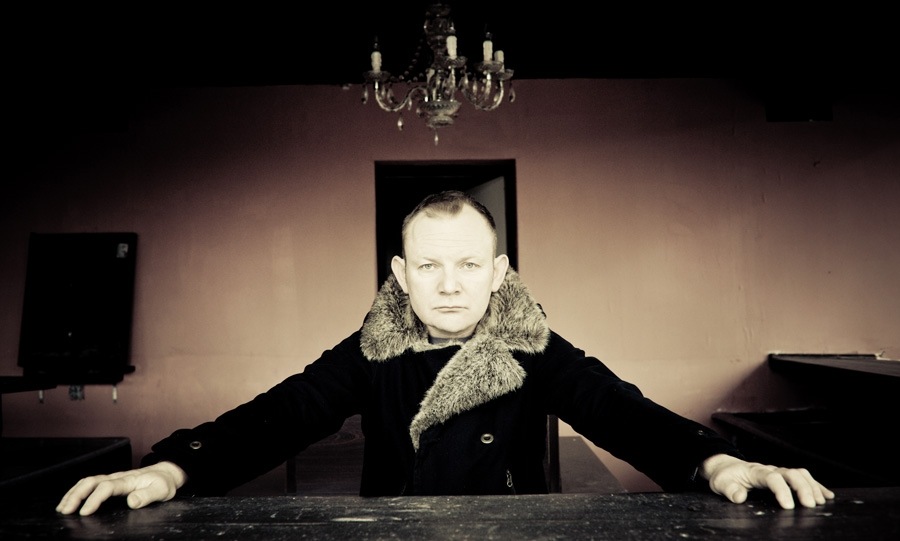

Paweł Mykietyn (born May 20, 1971, Oława) is a Polish Fryderyk winning composer and clarinetist.
By the year 2012, Mykietyn had written two symphonies, cello, piano and violin concertos, St. Marc Passions for soprano, narrator, choir and orchestra, some chamber music and musical King Lear. As a film composer he collaborated with Andrzej Wajda in Sweet Rush (2009), Jerzy Skolimowski in Essential Killing, and Małgorzata Szumowska in It.
Biography
Paweł Mykietyn graduated in music composition under the guidance of Włodzimierz Kotoński at the Fryderyk Chopin Music Academy in Warsaw in 1997. He participated in The Summer Composition Courses in Kazimierz Dolny (1991,1992,1993) and Gaudeamus Music Week in Amsterdam (1992). At the age of 22 he made his Warsaw Autumn Festival debut, with work La Strada. In 1994, as a clarinetist he won second edition contest 20th century music of Young Composers organized by the Polish Society of Contemporary Music. In 1995 his composition “3 for 13”, commissioned by Polish Radio, was placed first in the under 30 category at the UNESCO International Composers Rostrum in Paris.
Mykietyn is the founder of, and clarinetist in, the ensemble “Nonstrom” which has specialized in the performance of contemporary music. Since 1996 he has composed music for most of Krzysztof Warlikowski‘s productions. Occasionally he has worked with Grzegorz Jarzyna and Andrzej Woron. He is also a composer for the movies Mariusz Treliński’s “Egoists”, Małgorzata Szumowska’s “It” and Jerzy Skolimowski’s Essential Killing.
In 2011, Paweł Mykietyn was honored with the Knight’s Cross of the Order of Polonia Restituta for outstanding contribution to national culture and the promotion of Polish art in the world. In 2012, he was awarded Prix for Musique Sacem France for music to the film “Essential Killing” by Jerzy Skolimowski.
Major works
- At Radek’s (1993)
- 3 for 13 (1994) – first prize in the young composers’ category during the UNESCO International Rostrum of Composers in Paris in 1995, commissioned by the Polish Radio
- Epiphora (1996) – first prize in the young composers’ category at the UNESCO 4th International Rostrum of Electro-acoustic Music in AMsterdam, commissioned by the Polish Radio
- Piano Concerto (1997)
- Shakespeare’s Sonnets (2000)
- Klave (2004)
- Becoming Fine (Ładnienie) (2004)
- Second Symphony (2007)
- St. Mark Passion (2008)
- Third Symphony (2011)
- King Lear (2012)
- Walesa. Man of Hope (2013)
- The Other Lamb (2019)
https://en.wikipedia.org/wiki/Pawe%C5%82_Mykietyn
muzyka Paweł Mykietyn wykonawcy Lutoslawski String Quartet zdjęcie Magda Hueckel
CZARODZIEJSKA GÓRA Mykietyn / Sikorska-Miszczuk / Chyra / Bałka prapremiera 26 / 06 / 2015 Malta Festival Poznań www.malta-festival.pl
Paweł Mykietyn (*1971) – “Although Daedalus reached…” for clarinet, cello and piano (1990) Julian Paprocki, clarinet, Zuzanna Stradowska, cello, Joanna Wicherek, piano. Recorded by Ewa Olejnik, 14 IX 2011, Frederic Chopin University of Music (Painting: Patricia Arnillas – The fall of Icarus II)
Paweł Mykietyn Composer and clarinet player, born 20 May 1971 in Oława.
Pawel Mykietyn’s dazzling career began when he was very young and he has enjoyed numerous successes both in Poland and abroad since then. In 1993, while still a composition student under Włodzimierz Kotoński, he debuted at the Warsaw Autumn Festival of Contemporary Music with a piece titled La Strada. His success at that edition of the Warsaw Autumn culminated with festival organisers commissioning a composition from Mykietyn, who responded by creating Eine Kleine Herbstmusik. The performance of this piece at the festival in 1995 came to be viewed as one of the most important events of that edition. In the same year, Mykietyn’s 3 for 13, commissioned by Polish Radio, won the composer the first prize at the International Rostrum of Composers in Paris in the young composers’ category. In 1996, Mykietyn received a similar award at the 4th International Rostrum of Electro-Acoustic Music in Amsterdam for his Epiphora for Piano and Tape. Subsequent editions of the Warsaw Autumn brought premieres of more of Mykietyn’s compositions, including his Concerto for Piano and Orchestra in 1997, Commencement de Siecle in 1999, Shakespeare’s Sonnets in 2000, and finally the opera Ignorant I Szaleniec (An Ignoramus and a Madman) in 2001.
In 2000, he received the Polityka’s Passport Award. In 2008, his Symphony No. 2 (2007) was featured on the list of compositions recommended by the International Rostrum of Composers and won him the OPUS Public Media Award for contemporary classical music.
Paweł Mykietyn plays the clarinet in the Nonstrom Ensemble, a group founded by the composer himself that specialises in the performance of contemporary music. The ensemble includes a piano, cello, and trombone, apart from the clarinet. In 1995, Mykietyn took first prize as a clarinet player in the Competition of Young Performers of 20th Century Music organized by the Polish Society of Contemporary Music (Polish section of the ISCM).
Mykietyn composes on commissions from many festivals and institutions, amongst others the Warsaw Autumn Festival, the Polish Radio, the Wielki Theatre – National Opera, the National Audiovisual Institute, from bands such as the Belcea Quartet, de Ereprijs, Icebreaker and the Kronos Quartet, and performers, including Elżbieta Chojnacka, Jerzy Artysz, Andrzej Bauer, Maciej Grzybowski, Ewa Pobłocka, Jacek Laszczkowski, Jadwiga Rappé, as well as conductors – amongst others Jean-Paul Dessy, Jacek Kaspszyk, Jerzy Maksymiuk, Diego Masson, Wojciech Michniewski and Marek Moś. He also writes music for theatre, cooperating with, amongst others, Piotr Cieślak, Grzegorz Jarzyna and Andrzej Woron. For many years he collaborated with Krzysztof Warlikowski, who directed his opera An Ignoramus and a Madman (2000). In 1997-2001, he was the music director at the Studio Theatre in Warsaw, and since 2008 he has been conducting the music scene at the Nowy Theatre. In 2011, the album Mykietyn: Teatr was released. It contains pieces from Warlikowski’s performances selected by the composer himself.
In 2015, the premiere of Andrzej Chyra‘s The Magic Mountain with music by Mykietyn, libretto by Małgorzata Sikorska-Miszczuk and stage design by Mirosław Bałka took place at the Malta Festival in Poznań. Jacek Hawryluk wrote about Mykietyn’s music in Gazeta Wyborcza:
Mykietyn’s world of sound is very tempting: it refers to intelligent, non-academic electronics (more of the 90s than the latest productions), pop songs, sound effects of modern technology. But this is only the first impression.
Going further, we will hear echoes of the early music (deformed polyphony), fascination with microtonality, small gestures from which the score is woven. All of this overlaps with another aspect that the composer has already applied in the ‘Flute Concerto’ – the relativisation of time, ‘accelerating’ and ‘slowing it down’ (each subsequent quarter note does not last the same amount of time as the previous one, but is, for example, a bit slower). As a result, the sound is blurred, foreground and background are overlapped and mixed, and an impression of intermittent idleness and uncertainty occurs. Listening to the ‘Magic Mountain’ is like floating amidst sounds. It is a cool, mathematical score warmed up by human emotions.
Mykietyn composes film music as well. He wrote music to, amongst others, Małgorzata Szumowska‘s Stranger, 33 Scenes from Life and In the Name of…, Andrzej Wajda‘s Sweet Rush and Wałęsa: Man of Hope, as well as Essential Killing and 11 Minutes by Jerzy Skolimowski. For the music to Szumowska’s Father, he was awarded the Prix France Musique Sacem. Other achievements of Paweł Mykietyn in the field of film music include the Polish Film Award ‘Eagle’, an award in the Main Competition of the Gdynia Film Festival and the Fryderyk Award in the Composer of the Year category.
Pawel Mykietyn’s music is vivid, at times even aggressive in nature, and possesses a clear structure. The composer ostentatiously resorts to major-minor harmonics, introducing tonal fragments that alternate with harmonically free sections. He also draws on traditional melodic structures, transforming them into something altogether his own. Mykietyn seems to be a model post-modern artist – extremely confident and prepared to draw both inspiration and material from all available sources. Composing to him is much like putting together puzzles from ready-made elements. Mykietyn’s music brings out a great deal of emotion. Younger listeners, fascinated by its full sound and sharp rhythms, are its primary enthusiasts.
Considered one of the most valued Polish composers of the middle generation, Paweł Mykietyn was awarded the Knight’s Cross of the Order of Polonia Restituta (2011) and the Silver Medal for Merit to Culture – Gloria Artis (2015). The year 2015 brought him the Coryphaeus of Polish Music Award in the Personality of the Year category as well. The opera Magic Mountain, which premiered the same year, brought him the Polish Composers’ Union Award for 2016 and the Cyprian Kamil Norwid Award in the Music category for 2017. Moreover, in 2016 he received the Award of the President of the City of Gdańsk ‘Neptun’. In 2019, his piece Concerto No. 2 for Cello and Orchestra (2019) became the basis of the script for Maciej Stuhr‘s film of the same title.
Selected compositions:
- …Choć doleciał Dedal… / …Although Daedalus Reached…, trio for piano, clarinet and cello (1990)
- La Strada for three instruments (1991)
- Cztery preludia na fortepian / Four Preludes for piano (1992)
- U Radka / At Radek’s for clarinet, trombone, cello and piano (1993)
- 3 for 13 for 13 performers (1994)
- Sonatina für Alina for alto saxophone and tape(1994)
- Eine kleine Herbstmusik for 11 instruments (1995)
- Epifora / Epiphora for piano and tape (1996)
- Koncert na fortepian i orkiestrę / Concerto for Piano and Orchestra (1996)
- …Na temat własny / …On one’s own theme for chamber ensemble (1997)
- Four for Four for clarinet, trombone, cello and piano (1997)
- Koncert na wiolonczelę i orkiestrę / Concerto for Cello and Orchestra (1998)
- Kwartet smyczkowy / String Quartet (1998)
- Commencement de siecle for chamber ensemble and live electronics (1999)
- Before ‘Four for Four’ for clarinet, trombone, cello and piano (1999)
- Koncert na skrzypce i orkiestrę / Concerto for violin and orchestra (1999)
- Shakespeare’s Sonnets for male soprano and piano (2000)
- Ignorant i Szaleniec / An Ignoramus and a Madman, chamber opera (2001)
- Concerto for Harpsichord and Orchestra (2002)
- An Album Leaf for cello and computer (2002).
- Krzyki / Screams for string orchestra (2002)
- Krew / Blood symphonic poemforgreat orchestra (2003)
- Lekko / Light for 6 male voices (2003)
- Ładnienie / Getting Nicer for baritone, harpsicord tuned micro and string quartet (2004)
- Klave for harpsicord tuned micro and chamber orchestra (2004)
- Akt/ Act for clarinet, trombone, cello and piano (2005)
- String Quartet No. 2 (2006)
- Sonata for cello solo or live electronics (2006)
- Prolog for string (2006)
- Symphony No. 2 (2007)
- Pasja według św. Marka / The Passion According to Mark for soprano, reciting voice, natural voice, choir and chamber orchestra (2008)
- Symphony Vivo XXX (2010)
- III Symphony, for alto and orchestra (2011)
- Król Lear / King Lear, musical in two acts (2012)
- Koncert / Concerto forflute and orchestra (2013)
- Hommage à Oskar Dawicki, for symphony orchestra (2014)
- Magic Mountain, opera (2015)
- String Quartet No. 3 (2016)
- Koncert Podwójny / Double Concerto for two flutes and symphony orchestra (2016)
- Herr Thäddeus (2017)
- Dwie Ragi / Two Ragas for tabla (2017)
- Dwie Arabeski / Two Arabesques for piano solo (2018)
- Concerto for violin and symphony orchestra (2019)
- Concerto No. 2 for cello and orchestra (2019)
- Perpetuum Stabile for piano quartet (2019)
Film music:
- Mariusz Treliński – The Egoists (2000)
- Małgorzata Szumowska – Stranger (2004)
- Małgorzata Szumowska – Father (2005)
- Małgorzata Szumowska – 33 Scenes from Life (2008)
- Andrzej Wajda – Sweet Rush (2008)
- Jan Hryniak – Trick (2009)
- Jerzy Skolimowski – Essential Killing (2010)
- Filip Marczewski – Shameless (2011)
- Małgorzata Szumowska – In the Name of… (2012)
- Andrzej Wajda – Wałęsa: Man of Hope (2013)
- Katarzyna Jungowska – Fifth: Don’t Leave (2014)
- Jerzy Skolimowski – 11 Minutes (2015)
- Shraunas Bartas – Frost (2017)
- Małgorzata Szumowska – The Other Lamb (2019)
- Maciej Stuhr – Concerto No. 2 for Cello and Orchestra (2019) https://culture.pl/en/artist/pawel-mykietyn
